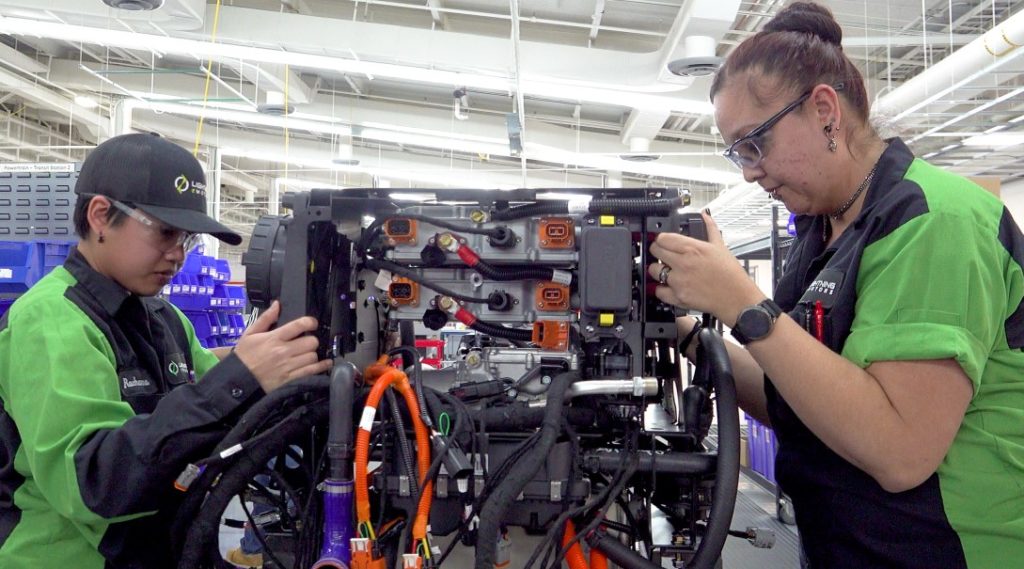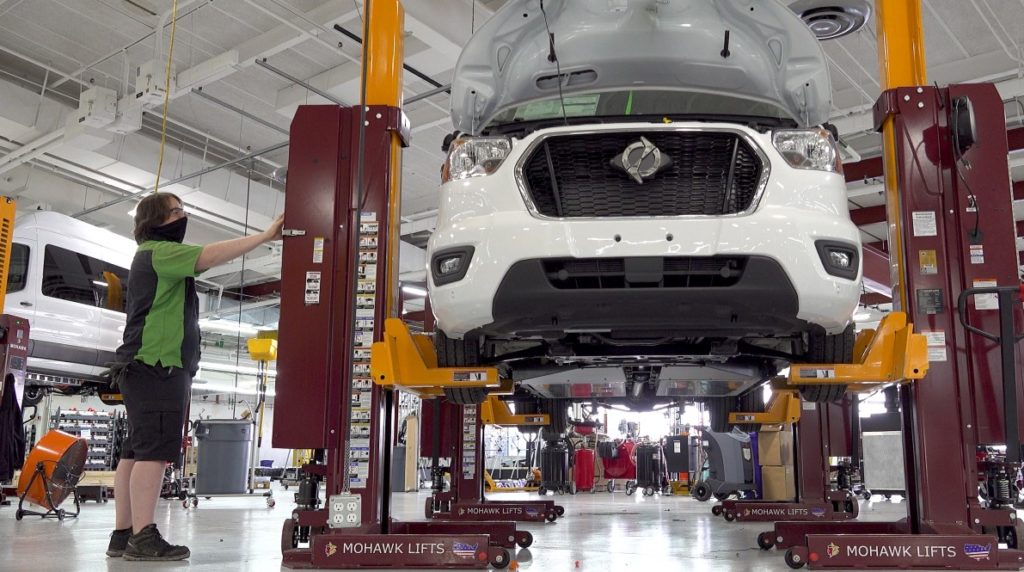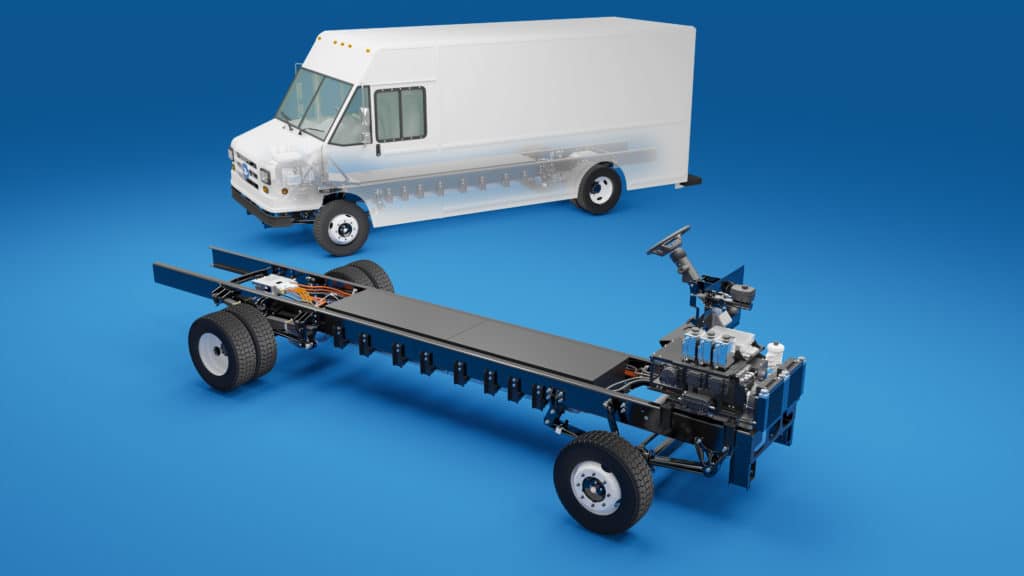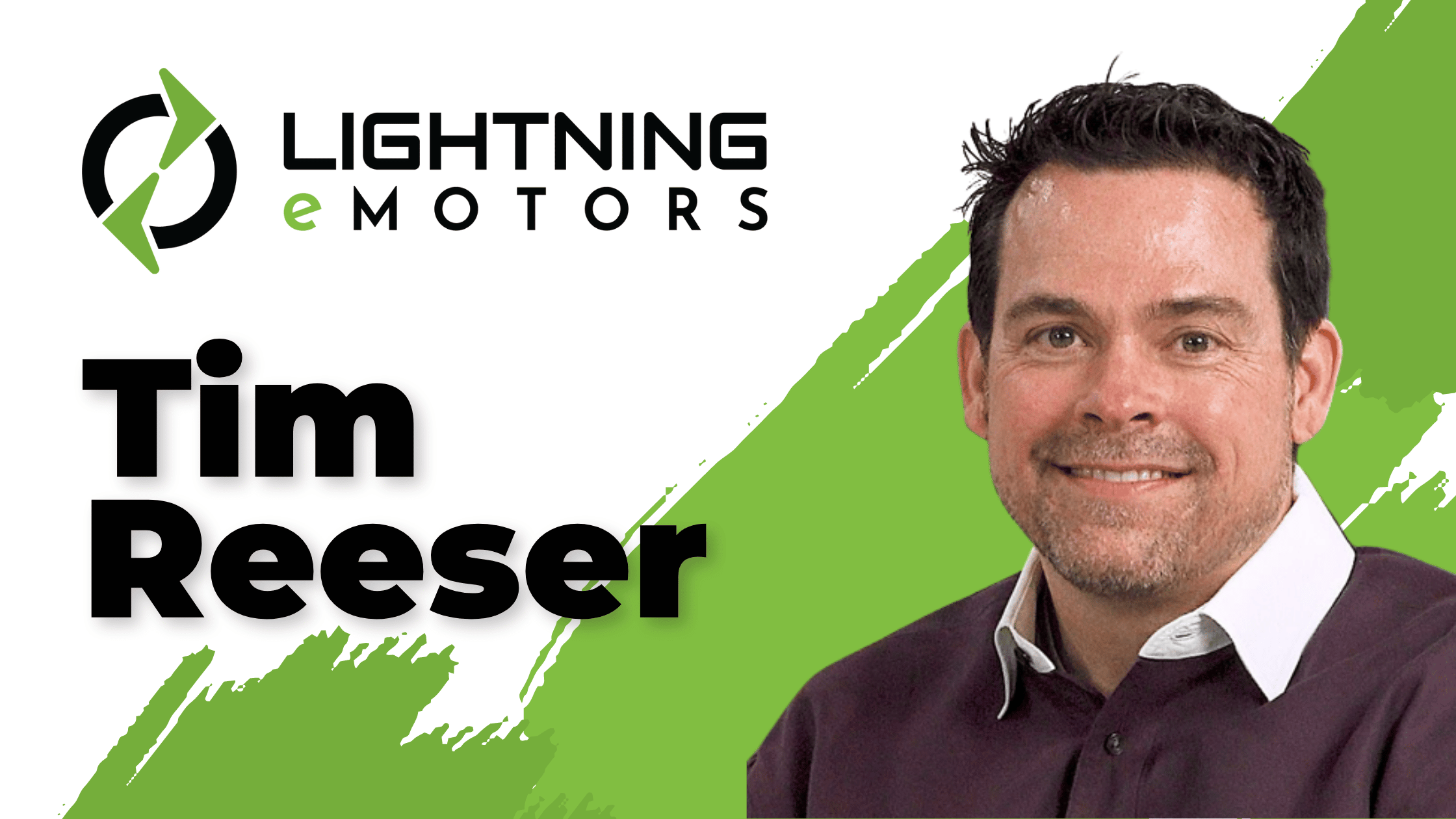The EV Report recently had an opportunity to connect with Tim Reeser, CEO of Lighting eMotors, to learn more about the organization and its impact on commercial fleet electrification.
Tim has a BS in Mechanical Engineering from CSU, and has been involved with alternative transportation technology since 1990 when he helped design the first dedicated CNG truck for General Motors while at Colorado State University.
Prior to co-founding Lightning eMotors, Tim served as Vice President of Colorado State University Ventures, where he spun out clean-tech companies and built the framework to support the accelerated growth of spin-outs and spin-ins at CSU. Prior to working at CSU, Tim founded, ran and successfully exited multiple software and IT infrastructure companies.
Lightning eMotors has evolved into a true leader in the electrification of fleet vehicles. What was the opportunity that Lightning eMotors originally saw in this space?
We began more than a decade ago as a producer of hybrid vehicles. But in 2017, it became clear to us that an exciting all-electric-vehicle future was taking shape in the commercial vehicle space. The big, global automakers are set up to handle high volume production, but their manufacturing infrastructure is often not nimble enough to handle the nuances of the smaller volume specialty commercial vehicles, including buses, box trucks, delivery vans, ambulances, recreational vehicles and others that are essential to keeping the global economy moving. That’s when we realized there was an opportunity to establish ourselves as a zero-emission vehicle provider in the commercial vehicle space.
We also knew that delivering zero-emission vehicles wasn’t going to just be about delivering sustainability – it also needed to be about delivering a better drive and ride experience for our customers. So that’s what we set out to do. And, since 2008, that’s what we’ve done.

Who are your customers today?
That’s a really exciting question for me to answer because we love our customers. Lightning vehicles are operated all across North America by postal agencies, ambulance companies, city transit authorities, freight and refrigerated delivery companies, business and university campuses, school districts, park systems and even recreational vehicle companies. In fact, I think people would be surprised at just how many fleet operators are currently leaning into fleet electrification. And, as the world continues to move toward a net neutral carbon footprint, the opportunities are only going to increase.
We believe Lightning eMotors continues to be the only full-range manufacturer of Class 3-7 battery-electric and fuel cell electric vehicles in the market. We are the only company currently shipping products in all of these classes today.
The automotive and commercial vehicle industry has – and continues to struggle with – supply chain disruptions. How is Lightning eMotors dealing with supply chain constraints?
There is no doubt that supply disruptions continue to be a significant issue facing our industry. Major chassis OEM’s continue to struggle with a new round of publicly announced lengthy factory shutdowns of their commercial vehicle chassis plants. Because of these shutdowns, we expect chassis availability will continue to be constrained for the next few quarters.
Our sales, engineering, manufacturing and supply chain teams have been taking measures to adapt to the circumstances. Those measures include announcements in the last quarter of certified repower products, as well as new platform options with Blue Bird and GM, and continued progress on our previously announced Class 4 Lightning eChassis. We expect our GM offerings to start production this year and our Blue Bird powertrain and Lightning eChassis in 2023.
Who are Lightning eMotors key partners?
We recently announced that Lightning eMotors will electrify GM’s platforms, including Class 3 through Class 6 medium-duty commercial vehicles. Other key partnerships announced over the past two years include Forest River, the largest shuttle bus manufacturer in North America, ambulance and bus manufacturer REV Group, California Transit Agencies, Global Medical Response Ambulances, ABC Companies/All Aboard America, Blue Bird Corporation, Perrone Robotics and we anticipate more exciting announcements in the coming months. Our battery partners currently include Contemporary Amperex Technology Co. Limited (CATL) and Proterra.

What has Lightning eMotors done to diversify its manufacturing and supplier base and partners?
At Lightning eMotors we are not only dedicated to working with our existing partners but continue to look for additional supply chain partners to bolster our flexibility, increase our product optionality, and maintain our position as a leading producer of Class 3 – 7 medium- and heavy-duty zero-emission commercial electric vehicles.
In December, we announced a strategic partnership with Contemporary Amperex Technology Co. Limited, also known as CATL, for a range of batteries. With its proven lineup of battery pack configurations, CATL fits firmly into our premium roster of battery partners, alongside our other primary battery supply – Proterra. A leading innovator in commercial vehicle electrification technology, Proterra powers our Class 3 through Class 5 commercial electric vehicles with its industry-leading battery technology.
We also announced a strategic partnership with Metalsa in January to produce proprietary e-chassis purpose-built for commercial EV applications, which we anticipate will help mitigate supply chain fluctuations and enhance our ability to produce and deliver new vehicles at a faster pace. Finally, in May, Blue Bird announced that it has chosen Lightning eMotors as its electric powertrain partner for its debut into the commercial chassis market.
What kind of demand does Lightning eMotors see out there in the marketplace for commercial electric vehicles? Is it increasing? If so, why?
Great question. Demand for electric vehicles has been rapidly increasing across both commercial and consumer markets, and I think everyone agrees it will continue to do so for the foreseeable future.
We’ve seen dramatic growth in orders in just the past three years. We actually had an order backlog of full vehicles, powertrain systems to be sold directly to customers, and charging systems, totaling more than 1,500 units and valued at $167.8 million at the end of April.
We know our customers like our vehicles because they are on the road today and their performance is monitored in real-time. In fact, we have sold more than 200 hybrid electric vehicles and 280 zero-emission vehicles that have collectively logged more than 1.6 million miles.
Plus, state and federal legislation continues to support and incentivize the development of commercial electric vehicles and continues to push industries toward cleaner solutions. We expect the 2021 Federal Infrastructure Bill, which provides over $10 billion in new funding for medium and heavy-duty commercial electric vehicles, will begin to be disbursed in Q4 of this year, driving customer demand for Lightning products and services in both the near and long term.
Finally, there’s been a growing interest in hydrogen fuel cell technology, and for good reason. Hydrogen fuel cells have a greater energy storage density than lithium-ion batteries, a longer range, and can also be refueled faster.
Lightning recently partnered with Plug Power Inc., a leading provider of hydrogen engines and fueling solutions enabling e-mobility. The collaboration enables both companies to offer electric, fuel cell-powered Class 6 trucks, weighing up to 12.5 tons and capable of supporting those very crucial middle-mile delivery logistics between warehouses and distribution centers. While the lack of a robust refueling infrastructure remains a barrier today, we believe the benefits of this technology will continue to lead to increased demand over the long term.

Do today’s commercial electric vehicles have an attractive long-term value proposition around the total cost of ownership savings?
Yes, I’m happy to say that’s the case. Our costs continue to come down and as that happens, we can show customers really solid total cost of ownership savings, even without the government subsidies. All three of these factors have led to a robust sales pipeline of about $1.5 billion – and we’re really excited about that.
What are the challenges to overcoming reluctance among industries to switch to all-electric vehicles?
The single largest barrier comes down to education. There is more work to be done to help CFOs understand that there is a really compelling total cost of ownership story for commercial EV fleets. As the price of diesel continues to go up, the cost of EV ownership continues to come down, drastically changing the cost of ownership equation in favor of EVs. That is a challenging proposition to communicate thoroughly, however, we are investing heavily in education and have continued to be a resource for our customers and others in the commercial EV industry.
Beyond education is infrastructure. Many of our customers who use Lightning vehicles for last-mile freight and passenger applications are waiting until they have a line of sight on when they can expect chargers to be installed at their fleet’s depot – much like consumer EV adoption is expected to accelerate exponentially with the establishment of a more robust national charging infrastructure.
This is why we entered the energy business: to help customers get in front of the problem and help accelerate some of that activity. For example, we’ve developed a mobile battery vehicle charger that customers can use while awaiting permits for permanent charging installations. Above all, these issues are solvable and we’re doing the work to overcome the challenges that come our way.
What do the next three, five or even 10 years look like for Lightning eMotors?
We are really well-positioned to meet all our future product development and sales goals. We continue to diversify our supply chain and vertically integrate a number of production capabilities where it makes sense. We are introducing advanced manufacturing capabilities into our Loveland manufacturing plant, using telematics to boost vehicle performance and improve the ownership experience, offering autonomous technology with our partners, and are expanded OEM partnerships. Meanwhile, we are investing in mobile charging solutions to ensure we remain a leader in commercial fleet vehicle electrification across the full spectrum of medium- and heavy-duty commercial fleet categories.
About Lightning eMotors:
Lightning eMotors, based in Loveland, Colorado, has been providing specialized and sustainable fleet solutions since 2009, deploying complete zero-emission-vehicle (ZEV) solutions for commercial fleets since 2018 – including Class 3 cargo and passenger vans, Class 4 and 5 cargo vans and shuttle buses, Class 4 Type A school buses, Class 6 work trucks, Class 7 city buses, and Class A motor coaches. The Lightning eMotors team designs, engineers, customizes, and manufactures zero-emission vehicles to support the wide array of fleet customer needs including school buses and ambulances, with a full suite of control software, telematics, analytics, and charging solutions to simplify the buying and ownership experience and maximize uptime and energy efficiency. Lightning eMotors also offers charging technologies and “charging as a service” (CaaS) to commercial and government fleets via its Lightning Energy division.
To learn more, visit https://lightningemotors.com.
Tag: Tim Reeser, Lightning eMotors








